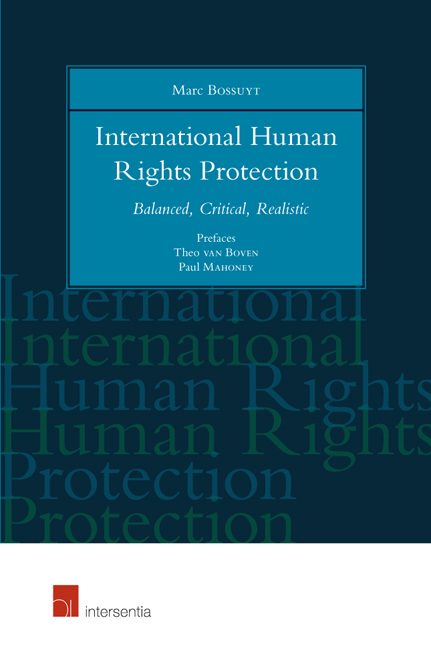Book contents
- Frontmatter
- Dedication
- Preface: A Lifetime of Fidelity and Participation
- Preface: A Penetrating and Salutary Analysis of the European System of Human Rights Protection
- Introduction
- Contents
- Epigraph
- PART ONE International Protection of Human Rights in General
- PART TWO Specific Human Rights Protection
- Annex: At the Crossroads of Law and Politics
- Bibliographies
- About the Author
Annex: At the Crossroads of Law and Politics
Published online by Cambridge University Press: 25 September 2018
- Frontmatter
- Dedication
- Preface: A Lifetime of Fidelity and Participation
- Preface: A Penetrating and Salutary Analysis of the European System of Human Rights Protection
- Introduction
- Contents
- Epigraph
- PART ONE International Protection of Human Rights in General
- PART TWO Specific Human Rights Protection
- Annex: At the Crossroads of Law and Politics
- Bibliographies
- About the Author
Summary
“Les hommes naissent et demeurent libres et égaux en droits”
This farewell lecture at the University of Antwerp gives me the opportunity to give some messages dear to my heart. They are based on my experiences in the field of the protection of human rights and they will be linked to a review of those experiences in the form of a personal testimony. The point of departure is the famous year of 1968.
THE PROHIBITION OF DISCRIMINATION
Indeed, on 23 July 1968, two weeks after my graduation as Doctor of Laws at the State University of Ghent, the European Court of Human Rights delivered its judgment in the Belgian linguistic case. After a very busy academic year, during which events dominated by linguistic issues had taken a prominent role, it was for me a particularly intriguing case. The question raised before the Court was: “Do the Belgian linguistic laws violate the prohibition of discrimination guaranteed by the European Convention on Human Rights?” And the question I asked myself was: “Is this a legal question or depends the reply on it from the political persuasion of those having to answer it?”
It took me several years (the time to write my PhD thesis) to answer that question. In doing so, I entered the field of the international protection of human rights. Important in that context was my participation in the first two sessions (1971 and 1972) of the International Institute of Human Rights (founded in Strasbourg by Nobel Prize winner René Cassin). In my PhD thesis, defended in Geneva in 1975, I concluded that it is possible to depoliticise that question to a great extent by identifying one by one (in concreto) the constitutive elements of the prohibition of discrimination. The constitutive elements of a legally unjustified difference in treatment are: the ground on which that difference is made; the right in which that difference is made; and the relation or the connexion (the relevance) between that ground and that right. At that time, there was not the slightest suspicion that I would ever end up in the Belgian Constitutional Court. That court did not yet exist and it was only in 1989 that it became competent to judge whether Belgian legislative norms violate the prohibition of discrimination.
- Type
- Chapter
- Information
- International Human Rights ProtectionBalanced, Critical, Realistic, pp. 181 - 206Publisher: IntersentiaPrint publication year: 2016



